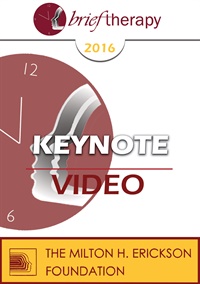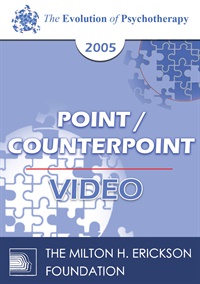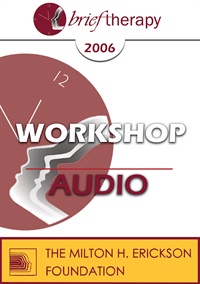
- Average Rating:
- Not yet rated
- Topic Areas:
- Workshops | Brief Therapy | Religion | Community | Life Focus Community
- Categories:
- Brief Therapy Conference | Brief Therapy Conference 2006
- Faculty:
- Erving Polster, PhD
- Duration:
- 2:09:45
- Format:
- Audio Only
- Original Program Date:
- Dec 07, 2006
- Short Description:
- With religion as a precedent and large group formation as an instrument, Dr. Polster will show how we may address the everyday, non-pathological needs of people. A complementary offshoot of these life-long groups is the reciprocal benefits it will share with brief therapy, supplying continuity to the brief therapy experience and individual focus to the large group formations.
- Price:
- $15.00 - Base Price

- Average Rating:
- Not yet rated
- Topic Areas:
- Workshops | Brief Therapy | Community | Relationships
- Categories:
- Brief Therapy Conference | Brief Therapy Conference 2006
- Faculty:
- Erving Polster, PhD
- Duration:
- 2:37:44
- Format:
- Audio Only
- Original Program Date:
- Dec 09, 2006
- Short Description:
- Within the enormous complexity of human experience, the reflex to connectedness rescues the person from fragmentation. Dr. Polster will portray connectedness along four dimensions: 1) person to person, enhancing relational experience and belonging; 2) moment to moment, restoring continuity and fluidity; 3) event to event, recovering life's storyline; 4) Characteristic to characteristic, integrating the self.
- Price:
- $15.00 - Base Price
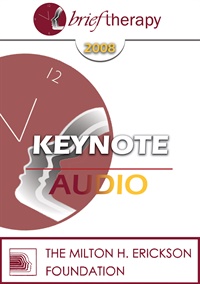
- Average Rating:
- Not yet rated
- Topic Areas:
- Keynotes | Brief Therapy | Community | Meditation, Spirituality and Yoga | Therapist Development
- Categories:
- Brief Therapy Conference | Brief Therapy Conference 2008
- Faculty:
- Jean Houston, PhD
- Duration:
- 1:03:17
- Format:
- Audio Only
- Original Program Date:
- Dec 13, 2008
- Short Description:
- Participants will learn how to incorporate sensory, psychological, mythic, spiritual and unitive states to bring personal potential to social change at a community, professional and cultural level.
- Price:
- $15.00 - Base Price
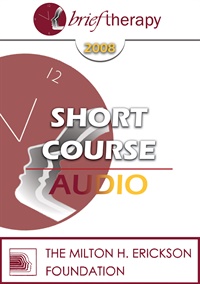
- Average Rating:
- Not yet rated
- Topic Areas:
- Short Courses | Community | Therapist Development
- Categories:
- Brief Therapy Conference | Brief Therapy Conference 2008
- Faculty:
- Les Blondino, LPC, LMFT
- Duration:
- 1:27:13
- Format:
- Audio Only
- Original Program Date:
- Dec 11, 2008
- Short Description:
- Today, prudent therapists learn not only to influence client's interactions within their natural social context, but also influence their interactions with the helping system. In this workshop, the problematic relations between helping and family systems and strategies to change them will be described. Three areas will be explored: 1) humanistic approach to services; 2) correcting the family hierarchy; 3) boundary building.
- Price:
- $15.00 - Base Price
- Average Rating:
- Not yet rated
- Topic Areas:
- Keynotes | Multicultural | Community
- Categories:
- Brief Therapy Conference | Brief Therapy Conference 2016
- Faculty:
- Erving Polster, PhD | Michael Yapko, PhD
- Course Levels:
- Master Degree or Higher in Health-Related Field
- Duration:
- 1:01:39
- Format:
- Audio and Video
- Original Program Date:
- Dec 09, 2016
- Short Description:
- Yapko and Polster examine the idea of “life focus” groups as a natural extension of psychotherapy, designed not for problem-solving but for cultivating reflection, belonging, and continuity in community. Highlighting themes like design, congregation, and continuity, the keynote draws parallels to religion, the arts, and large-scale social movements while imagining new, non-clinical spaces for shared growth. Participants gain a broader vision of how psychotherapy’s principles can inspire communal practices that enhance meaning and vitality in everyday life.
- Price:
-
Sale is $29.00
price reduced from Base Price - $59.00
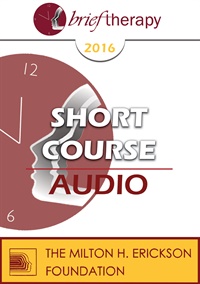
- Average Rating:
- Not yet rated
- Topic Areas:
- Short Courses | Brief Therapy | Community | Multicultural | Therapist Development
- Categories:
- Brief Therapy Conference | Brief Therapy Conference 2016
- Faculty:
- Karin Schlanger, MFT | Gloria Diaz Arnal, MFT Intern
- Duration:
- 1:11:09
- Format:
- Audio Only
- Original Program Date:
- Dec 08, 2016
- Short Description:
- Palo Alto Brief Therapy model applied in an educational context. Focus on advantages of using this approach when the context is a challenge in itself. The presenters – Ms. Schlanger is the heir to the MRI-Brief Therapy model, will bring examples illustrating a useful model when working with a diverse community.
- Price:
- $15.00 - Base Price
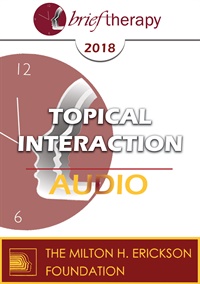
- Average Rating:
- Not yet rated
- Topic Areas:
- Topical Interactions | Anxiety | Brief Therapy | Children and Adolescent Therapy | Community | Depression
- Categories:
- Brief Therapy Conference | Brief Therapy Conference 2018
- Faculty:
- Lynn Lyons, LICSW
- Duration:
- 1:03:32
- Format:
- Audio Only
- Original Program Date:
- Dec 08, 2018
- Short Description:
- Educators are being asked to do more and more to support the emotional wellbeing of students and understand the mental health needs of their students. Programs are consistently being introduced and professional development offered. What's working and what isn't? How much can we expect of teachers and administrators? How is the collaboration and communication between parents, schools, and outside providers going? And what are students actually earning in about their mental health in school?
- Price:
- $15.00 - Base Price
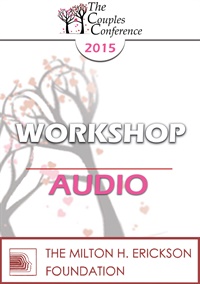
- Average Rating:
- Not yet rated
- Topic Areas:
- Couples Therapy | Workshops | Community
- Categories:
- Couples Conference | Couples Conference 2015 | Pioneers in Couples and Family Therapy
- Faculty:
- William Doherty, PhD
- Duration:
- 1:50:01
- Format:
- Audio Only
- Original Program Date:
- Apr 26, 2015
- Short Description:
- People turn to friends and family long before they go to a couples therapist. Marital First Responders is a new training program for people who are natural confidants on relationship problems: people turn to them for support and perspective. Learn what the training involves, tune your skills in being a confidant in your own social world, and see if you’d like to teach this course in your community.
- Price:
- $15.00 - Base Price
Credit available - Click Here for more information
- Average Rating:
- Not yet rated
- Topic Areas:
- Keynotes | Continuing Education | Couples Therapy | Community | IMAGO | Relationships
- Categories:
- Couples Conference | Couples Conference 2018 | Online Continuing Education | Pioneers in Couples and Family Therapy
- Faculty:
- Harville Hendrix, PhD | Helen LaKelly Hunt, PhD
- Course Levels:
- Master Degree or Higher in Health-Related Field
- Duration:
- 54:42
- Format:
- Audio and Video
- Original Program Date:
- May 05, 2018
- Short Description:
- This keynote highlights the vision behind Safe Conversations and the Dallas Project, a large-scale initiative to improve relational health citywide. Hendrix and Hunt share how teaching dialogue, empathy, and zero-negativity practices can reduce divorce, poverty, and social fragmentation. They emphasize connection as a cultural foundation and present couples as catalysts for societal healing, promoting a shift from individual to relational models of mental health.
- Price:
-
Sale is $29.00
price reduced from Base Price - $59.00
- Average Rating:
- Not yet rated
- Topic Areas:
- Point/Counterpoint Sessions | Multicultural | Community | Psychotherapy | Social Issues
- Categories:
- Evolution of Psychotherapy | Evolution of Psychotherapy 2005
- Faculty:
- Jean Houston, PhD | Mary Catherine Bateson, PhD
- Course Levels:
- Master Degree or Higher in Health-Related Field
- Duration:
- 1:19:00
- Format:
- Audio and Video
- Original Program Date:
- Dec 08, 2005
- Short Description:
- This session explores the idea of the therapist as a social artist, someone whose work extends beyond the consulting room into culture, community, and leadership. The faculty examines how therapeutic skills like deep listening, imagination, metaphor, and improvisation can support social healing, ethical action, and collective change in times of global stress. Participants are invited to rethink psychotherapy as both a personal and cultural practice, one that helps individuals and communities adapt, create meaning, and participate more consciously in shaping the world they live in.
- Price:
-
Sale is $29.00
price reduced from Base Price - $59.00
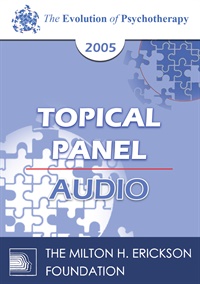
- Average Rating:
- Not yet rated
- Topic Areas:
- Topical Panels | Psychotherapy | Therapist Development | Community | Social Issues
- Categories:
- Evolution of Psychotherapy | Evolution of Psychotherapy 2005 | Pioneers in Couples and Family Therapy
- Faculty:
- Mary Goulding, MSW | James F. Masterson, MD | Cloe Madanes, HDL, LIC | Jean Houston, PhD
- Duration:
- 1 Hour
- Format:
- Audio Only
- Original Program Date:
- Dec 09, 2005
- Short Description:
- This discussion examines therapist perspectives on therapeutic neutrality and social commitment. Mary Goulding highlights community resilience, while James Masterson supports neutrality with social awareness. Cloe Madanes advocates for directive therapy to protect the vulnerable, and Jean Houston calls for integrating personal and societal healing. The panel agrees that therapists must address social issues without compromising clinical integrity, acting as both healers and agents of change. Moderated by Jon Carlson, PsyD, EdD
- Price:
- $15.00 - Base Price
Credit available - Click Here for more information
- Average Rating:
- Not yet rated
- Topic Areas:
- Speeches with Discussants | Gestalt | Life Focus Community | Psychotherapy | Community | Narrative Therapy
- Bundle(s):
- Learning Track - EP17 Gestalt Stream
- Categories:
- Evolution of Psychotherapy | Evolution of Psychotherapy 2017 | Evolution of Psychotherapy Gestalt Learning Track | Online Continuing Education
- Faculty:
- Erving Polster, PhD | Michael Yapko, PhD
- Course Levels:
- Master Degree or Higher in Health-Related Field
- Duration:
- 1:24:44
- Format:
- Audio and Video
- Original Program Date:
- Dec 16, 2017
- Short Description:
- In this inspiring dialogue, Polster and Yapko explore how psychotherapy’s principles can extend beyond the consulting room to enrich everyday life and community. Polster shares his vision of “life-focus groups,” gatherings that cultivate meaning, connection, and shared storytelling rather than symptom relief. Participants learn how communal dialogue, thematic exploration, and belonging can become powerful catalysts for growth, healing, and human continuity.
- Price:
-
Sale is $29.00
price reduced from Base Price - $59.00
- Average Rating:
- Not yet rated
- Topic Areas:
- Invited Addresses | Psychotherapy | Therapist Development | Children and Adolescent Therapy | Community
- Categories:
- Evolution of Psychotherapy | Evolution of Psychotherapy 1985
- Faculty:
- Bruno Bettelheim | Ronald Laing, MD
- Course Levels:
- Master Degree or Higher in Health-Related Field
- Duration:
- 1:28:20
- Format:
- Audio and Video
- Original Program Date:
- Dec 13, 1985
- Short Description:
- In this powerful address, Bruno Bettelheim traces the evolution of the “therapeutic milieu,” drawing on his work with autistic and schizophrenic children at the Orthogenic School. Through vivid clinical stories and practical detail, he shows how every aspect of daily life, from meals and baths to architecture and staff consensus, can become part of treatment when the entire environment is organized around restoring trust, dignity, and the desire to live.
- Price:
-
Sale is $29.00
price reduced from Base Price - $59.00
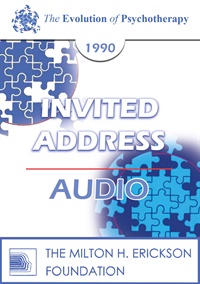
- Average Rating:
- Not yet rated
- Topic Areas:
- Invited Addresses | Addiction | Community | Social Issues | Psychotherapy
- Categories:
- Evolution of Psychotherapy | Evolution of Psychotherapy 1990
- Faculty:
- Thomas Szasz, MD | Rollo May, PhD
- Duration:
- 1 Hour 20 Minutes
- Format:
- Audio Only
- Original Program Date:
- Dec 15, 1990
- Short Description:
- Dr. Szasz will present a brief historical review of drug controls in the United States; a critical analysis of the transformation of the trade in drugs from a free market at the beginning of the century to a tightly statist system of controls today; and a market-oriented analysis of the "drug problem."
- Price:
- $15.00 - Base Price
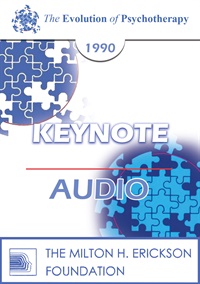
- Average Rating:
- Not yet rated
- Topic Areas:
- Keynotes | Community | Femininity | Gender | Masculinity | Social Issues | Psychotherapy
- Categories:
- Evolution of Psychotherapy | Evolution of Psychotherapy 1990
- Faculty:
- Betty Friedan
- Duration:
- 1 Hour 6 Minutes
- Format:
- Audio Only
- Original Program Date:
- Dec 16, 1990
- Short Description:
- The enormous changes brought about in the last 25 years by the women's movement and the sex role revolution have opened new possibilities and problems-sources of conflict and new strengths for women, men and families. There is a challenge now for psychotherapists to break through their own remnant stereotypes of feminine mystique, masculine mystique, and obsolete assumptions about family so that they may distinguish between personal and political pathology and help evolving women, men and families find and use more consciously their new strengths and confront real problems realistically.
- Price:
- $15.00 - Base Price

- Average Rating:
- Not yet rated
- Topic Areas:
- Workshops | Strengths-Based | Personality Disorders | Trauma | Community
- Categories:
- Erickson Congress | Erickson Congress 2011
- Faculty:
- Cheryl Bell-Gadsby, M.A., R.C.C.
- Duration:
- 59 Minutes
- Format:
- Audio Only
- Original Program Date:
- Dec 07, 2011
- Short Description:
- Chronic homelessness is rarely just about housing. This workshop examines how trauma, untreated mental illness, and relational rupture shape life on the streets, and how therapists and outreach teams can respond differently. Blending Ericksonian principles, neurobiology, and community-based practice, it offers a practical framework for moving from first contact to collaboration, stability, and renewed connection.
- Price:
- $20.00 - Base Price
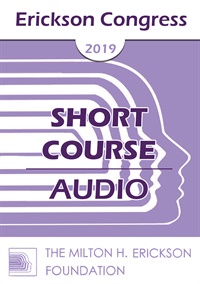
- Average Rating:
- Not yet rated
- Topic Areas:
- Short Courses | Multicultural | Religion | Community
- Categories:
- Erickson Congress | Erickson Congress 2019
- Faculty:
- Joanne Ginter, MA
- Duration:
- 1 Hour 6 Minutes
- Format:
- Audio Only
- Original Program Date:
- Dec 12, 2019
- Short Description:
- This workshop emphasizes ways culture and religion can be integrated into the therapeutic discourse through the promotion of intercultural resiliency. Interculturalism allows for relationship building and learning from each other while taking the therapist deeper than multicultural or cross-cultural communication. Resiliency as a healing process allows for creating new meanings to unfortunate life events based on developing the self through mentorship and community, the building blocks of resiliency.
- Price:
- $15.00 - Base Price
Tags: Community Multi-Cultural Religion
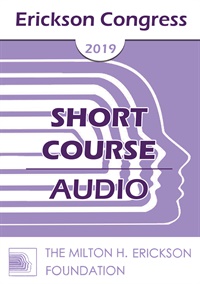
- Average Rating:
- Not yet rated
- Topic Areas:
- Short Courses | Community | Ericksonian Hypnosis and Therapy Techniques | Relationships
- Categories:
- Erickson Congress | Erickson Congress 2019
- Faculty:
- Gabrielle Peacock, MBBS
- Duration:
- 1 Hour 25 Minutes
- Format:
- Audio Only
- Original Program Date:
- Dec 12, 2019
- Short Description:
- Dr Erickson’s work with individuals, couples and families has been well explored, but what is often overlooked is his skill in information gathering and interventions that connected a client to their community. Communities are not what they were in his time and attempts to do this without first building a healing community can be fraught.
- Price:
- $15.00 - Base Price
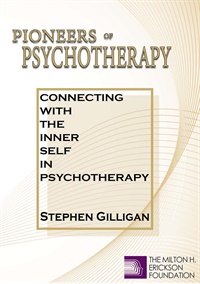
- Average Rating:
- Not yet rated
- Topic Areas:
- Clinical Demonstrations | Psychotherapy | Hypnosis | Hypnotic Induction | Community | Meditation, Spirituality and Yoga
- Bundle(s):
- Pioneers of Psychotherapy Bundle
- Categories:
- Pioneers of Psychotherapy | Brief Therapy Conference | Brief Therapy Conference 2008
- Faculty:
- Stephen Gilligan, PhD
- Course Levels:
- Master Degree or Higher in Health-Related Field
- Duration:
- 00:53:00
- Format:
- Audio and Video
- Original Program Date:
- Dec 12, 2008
- Short Description:
- Stephen Gilligan (2008) demonstrates the induction of a trance with a volunteer who wants to “feel at home” with herself, but often feels disconnected and scattered. He invites intention and uses mindfulness and body movement to release the weight of fear and disconnection. Afterward, the volunteer claims the experience was “intense,” and “beautiful.”
- Price:
- $59.00 - Base Price


